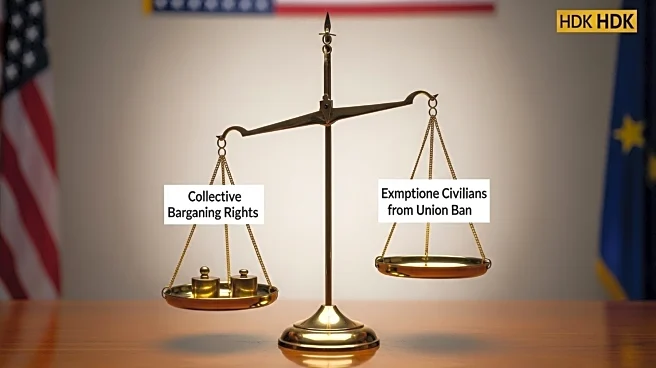What's Happening?
The U.S. House of Representatives has passed the National Defense Authorization Act (NDAA) for fiscal year 2026, which includes a provision exempting civilian employees of the Defense Department from President Trump's executive orders that aim to strip federal workers of their collective bargaining rights. The executive orders, issued in March and expanded in subsequent months, invoked a rarely used provision of the 1978 Civil Service Reform Act to ban unions across much of the federal government under the guise of national security. However, the House Armed Services Committee included a measure in the NDAA to prevent the use of fiscal 2026 funds to enforce this ban on Defense Department civilians. The bill passed with a vote of 231-196, with three Republicans joining Democrats in support. Union leaders have praised the decision, viewing it as a sign of insufficient Republican support for the executive orders.
Why It's Important?
The inclusion of this provision in the NDAA is significant as it preserves the collective bargaining rights of a substantial portion of the federal workforce, which unions argue are crucial for improving government efficiency and employee retention. The decision reflects bipartisan support for maintaining these rights, despite the executive orders. The outcome is a victory for federal employee unions, which have been advocating for the protection of these rights for decades. The move also highlights the ongoing political struggle over labor rights within the federal government, with potential implications for future policy decisions and labor relations.
What's Next?
The NDAA will proceed to the Senate, where further debate and amendments are possible. Union leaders and supporters of collective bargaining will likely continue to lobby for the preservation of these rights in the final version of the bill. Additionally, the Protect America’s Workforce Act, which seeks to nullify the executive orders entirely, is close to reaching the necessary support to be considered on the House floor. The outcome of these legislative efforts will be closely watched by federal employees and labor organizations.
Beyond the Headlines
The preservation of collective bargaining rights for Defense Department civilians could set a precedent for other federal agencies facing similar challenges. It underscores the importance of labor rights in the context of national security and government operations. The decision may also influence future executive actions and legislative measures related to federal workforce management.








